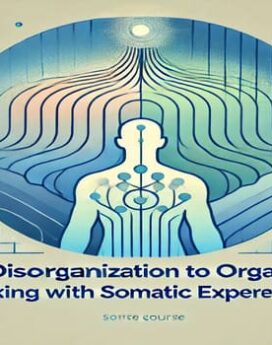Expressive Arts Therapy as Somatically-Based Interventions with Trauma: Using Rhythm, Movement, Sound, and Imagery for Embodied Awareness
Original price was: $38.00.$17.00Current price is: $17.00.
This course is ideal for therapists, counselors, social workers, and mental health professionals who work with trauma survivors. It is also suitable for those in expressive arts, dance therapy, and body-oriented healing practices, as well as anyone interested in using creative modalities for emotional healing.
Simplify your learning with the Expressive Arts Therapy as Somatically-Based Interventions with Trauma: Using Rhythm, Movement, Sound, and Imagery for Embodied Awareness course, priced at just Original price was: $38.00.$17.00Current price is: $17.00. on EDUxify! We make education accessible with over 60,000 downloadable digital courses across Health and Medical, Trending & Bestselling. Get expert-guided, self-paced content and save over 80%. Eduxify your knowledge today!
Expressive Arts Therapy as Somatically-Based Interventions with Trauma: Using Rhythm, Movement, Sound, and Imagery for Embodied Awareness
Course Summary
The “Expressive Arts Therapy as Somatically-Based Interventions with Trauma” course offers a profound approach to trauma recovery using rhythm, movement, sound, and imagery. By integrating these therapeutic modalities, the course guides practitioners on how to facilitate embodied awareness and healing for individuals who have experienced trauma. This somatically-based intervention fosters emotional release, creativity, and personal empowerment.
Course Overview
This course explores the application of expressive arts therapy in trauma treatment. It highlights how rhythm, movement, sound, and imagery can be used to unlock emotions stored in the body, providing relief from traumatic experiences. Participants will gain practical skills to integrate these methods into their therapeutic practice, enhancing the healing process for trauma survivors.
Course Effectiveness

Expressive arts therapy has been recognized as an effective treatment for trauma due to its ability to engage the whole body in the healing process. This course demonstrates how movement, sound, and imagery can access parts of the brain that verbal therapy may not reach, making it highly effective for deep emotional processing and trauma resolution.
Who Should Learn
This course is ideal for therapists, counselors, social workers, and mental health professionals who work with trauma survivors. It is also suitable for those in expressive arts, dance therapy, and body-oriented healing practices, as well as anyone interested in using creative modalities for emotional healing.
Key Topics Covered
- The therapeutic use of rhythm and sound in trauma recovery
- Movement-based interventions for somatic release
- Using imagery and visual expression for emotional awareness
- How to integrate expressive arts into clinical practice
- Case studies on trauma recovery using expressive arts therapy
Feedback from Participants
Participants have expressed profound appreciation for the unique approach of this course. Many have found the techniques transformative, reporting significant shifts in both their clients’ healing processes and their own professional development. This course has been praised for its hands-on exercises and real-world applicability.
Testimonials
Sarah T., Expressive Arts Therapist: “This course was a game-changer for my practice. The blend of sound, movement, and imagery helped my clients release trauma that years of verbal therapy could not address. I highly recommend it!”
John M., Trauma Counselor: “I was amazed by the effectiveness of these techniques. My clients have responded incredibly well to the somatic interventions. This training has taken my therapy sessions to a whole new level.”
Course Structure and Content
The course is divided into six modules, each focusing on a specific expressive arts modality. Participants will learn how to facilitate therapeutic sessions using rhythm, movement, sound, and imagery. The course includes video demonstrations, case studies, and practical exercises, allowing for immediate application of the concepts.
This image depicts a therapeutic setting where individuals engage in expressive arts therapy through rhythm, movement, and imagery to promote embodied awareness and trauma recovery.
Transform your learning experience with the Expressive Arts Therapy as Somatically-Based Interventions with Trauma: Using Rhythm, Movement, Sound, and Imagery for Embodied Awareness course at https://www.google.com/search?q=Eduxify.com! Gain lifetime access to expertly curated digital content, designed to streamline your career growth and personal development.
- Lifetime Access: Enjoy unlimited, permanent access to your purchased courses.
- Massive Savings: Get top-tier courses at prices up to 80% lower than original sales pages.
- Secure Payments: Shop with confidence using our trusted payment methods (PayPal, Stripe).
- Practical Knowledge: Empower your career with actionable, real-world skills.
- Instant Access: Start learning immediately after purchase via your account dashboard or email.
- Learn Anywhere: Access your courses on any device (desktop, mobile, tablet).
Start your simplified learning journey today with EDUxify!
Only logged in customers who have purchased this product may leave a review.







Reviews
There are no reviews yet.